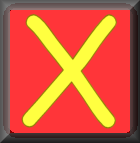
 |
BIDMASA self marking exercise testing the application of BIDMAS, an acronym describing the order of operations used when evaluating expressions. |
This is level 1; Click on the operations in the correct order..
InstructionsTry your best to answer the questions above. Type your answers into the boxes provided leaving no spaces. As you work through the exercise regularly click the "check" button. If you have any wrong answers, do your best to do corrections but if there is anything you don't understand, please ask your teacher for help. When you have got all of the questions correct you may want to print out this page and paste it into your exercise book. If you keep your work in an ePortfolio you could take a screen shot of your answers and paste that into your Maths file. |
||
|
|
||
|
|

|
More Activities: |
|
Mathematicians are not the people who find Maths easy; they are the people who enjoy how mystifying, puzzling and hard it is. Are you a mathematician? Comment recorded on the 1 February 'Starter of the Day' page by M Chant, Chase Lane School Harwich: "My year five children look forward to their daily challenge and enjoy the problems as much as I do. A great resource - thanks a million." Comment recorded on the 9 April 'Starter of the Day' page by Jan, South Canterbury: "Thank you for sharing such a great resource. I was about to try and get together a bank of starters but time is always required elsewhere, so thank you." |
Each month a newsletter is published containing details of the new additions to the Transum website and a new puzzle of the month. The newsletter is then duplicated as a podcast which is available on the major delivery networks. You can listen to the podcast while you are commuting, exercising or relaxing. Transum breaking news is available on Twitter @Transum and if that's not enough there is also a Transum Facebook page. |
|
Numeracy"Numeracy is a proficiency which is developed mainly in Mathematics but also in other subjects. It is more than an ability to do basic arithmetic. It involves developing confidence and competence with numbers and measures. It requires understanding of the number system, a repertoire of mathematical techniques, and an inclination and ability to solve quantitative or spatial problems in a range of contexts. Numeracy also demands understanding of the ways in which data are gathered by counting and measuring, and presented in graphs, diagrams, charts and tables." Secondary National Strategy, Mathematics at key stage 3 |
||
Go MathsLearning and understanding Mathematics, at every level, requires learner engagement. Mathematics is not a spectator sport. Sometimes traditional teaching fails to actively involve students. One way to address the problem is through the use of interactive activities and this web site provides many of those. The Go Maths page is an alphabetical list of free activities designed for students in Secondary/High school. Maths MapAre you looking for something specific? An exercise to supplement the topic you are studying at school at the moment perhaps. Navigate using our Maths Map to find exercises, puzzles and Maths lesson starters grouped by topic. | ||
Teachers | ||
|
If you found this activity useful don't forget to record it in your scheme of work or learning management system. The short URL, ready to be copied and pasted, is as follows: |
Alternatively, if you use Google Classroom, all you have to do is click on the green icon below in order to add this activity to one of your classes. |
It may be worth remembering that if Transum.org should go offline for whatever reason, there is a mirror site at Transum.info that contains most of the resources that are available here on Transum.org. When planning to use technology in your lesson always have a plan B! |
|
|
||
© Transum Mathematics 1997-2026
Scan the QR code below to visit the online version of this activity.
https://www.Transum.org/go/?Num=225
Close

Level 1 - Click on the operations in the correct order.
Level 2 - Evaluate the simple expressions using the correct order of operations.
Level 3 - Drag the brackets onto the calculations to make them correct.
Level 4 - Evaluate the harder expressions using the correct order of operations.
Level 5 - Find the number that exploded in each of these calculations.
Missing Operations - Try this Starter of the Day and decide what mathematical operations are required.
Misconception - A video explaining a BIDMAS problem which went viral on Twitter.
X Divided by 2Y - A Maths Lesson Starter based on the BIDMAS misconception.
BIDMAS Game - A game for two or more players making BIDMAS calculations to claim squares on a grid.
Barmy BIDMAS - An Advanced Lesson Starter about a misleading way of stating the answer to a simple calculation.
Don't wait until you have finished the exercises before you click on the 'Check' button. Click it often as you work through the questions to see if you are answering them correctly. You can double-click the 'Check' button to make it float at the bottom of your screen.
For this exercise you don't have to make any calculations!
All you have to do is click on the operations in the correct order. If you get it right the next stage of the calculation will appear.
1. If there are brackets in the expression, click on the calculation inside the brackets first.
2. If a power or index is present in the calculation, click on that next.
3. Click on multiplication and division signs, working from left to right through the expression.
4. Finally click on addition and subtraction signs, working from left to right through the expression.

People have found an acronym a useful way to remember the order of operations.
The letters of BIDMAS stand for:
When only addition and subtraction (or only multiplication and division) are left in an expression you should work them out in the order you find them, starting from the left and working towards the right. The blue image of the letters above has been designed to show that multiplication and division have the same importance as the letter M is in the same position as the letter D. The same can be said for the letters A and S.
For example, to evaluate the expression 32 + 5 x 7 - (4 - 3)
Work out the brackets first which gives 32 + 5 x 7 - 1
Then the indices 9 + 5 x 7 - 1
Then the multiplication 9 + 35 - 1
Then the addition and subtraction in the order they are given
The answer is 43

PEMDAS is an alternative acronym.
Don't wait until you have finished the exercise before you click on the 'Check' button. Click it often as you work through the questions to see if you are answering them correctly. You can double-click the 'Check' button to make it float at the bottom of your screen.
Answers to this exercise are available lower down this page when you are logged in to your Transum account. If you don’t yet have a Transum subscription one can be very quickly set up if you are a teacher, tutor or parent.
Close
